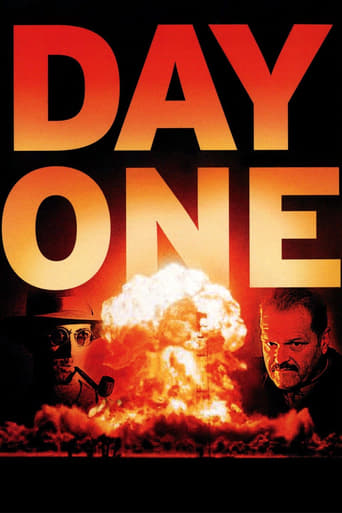This day will go down in history as a black mark against mankind.
"Day One" (1989), a compelling television film produced by World International Network (WIN) and Spelling Entertainment, delves into the harrowing events surrounding the atomic bombings of Hiroshima and Nagasaki during World War II. Set primarily in the United States and Canada, the film meticulously reconstructs the tense atmosphere of the Manhattan Project, the top-secret research initiative that developed the first nuclear weapons. Through its narrative, "Day One" not only explores the scientific and military aspects of the bomb's creation but also delves into the ethical dilemmas faced by the scientists involved, offering a nuanced portrayal of their internal conflicts and the broader implications of their work. The film boasts a strong ensemble cast, with Brian Dennehy delivering a standout performance as General Leslie Groves, the military leader of the Manhattan Project. His portrayal captures the general's unwavering determination and the immense pressure he faced to deliver the bomb before the war's end. Alongside him, David Strathairn's nuanced depiction of J. Robert Oppenheimer, the scientific director, adds depth to the film, highlighting the physicist's intellectual prowess and moral struggles. The chemistry between the lead actors and the supporting cast effectively brings to life the high-stakes environment of the project and the personal toll it took on those involved. "Day One" also excels in its attention to historical detail, using authentic locations and period-appropriate sets to immerse viewers in the era. The film's depiction of the Trinity test, the first detonation of a nuclear weapon, is particularly striking, capturing the awe and fear that the event inspired. By juxtaposing the scientific triumph with the devastating consequences of the bombings, the film prompts viewers to reflect on the complex legacy of the Manhattan Project and the moral responsibilities of those who wield such destructive power. Ultimately, "Day One" stands as a poignant reminder of the human cost of war and the ethical quandaries posed by scientific advancement. Produced by WIN and Spelling Entertainment, the film not only serves as a historical document but also as a cautionary tale about the consequences of unchecked ambition. Its release in 1989, during a period of renewed interest in Cold War history, underscores its relevance and enduring impact on audiences in both the United States and Canada.
Năm:1989
Thời lượng141 phút
Thể loạiPhim Lịch SửPhim Chính KịchChương Trình Truyền Hình
Các quốc gia sản xuấtCanadaUnited States of America


